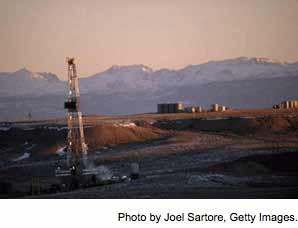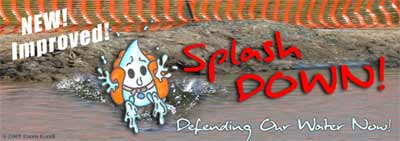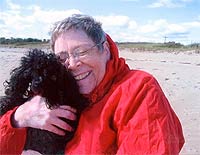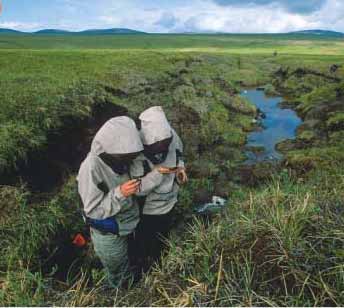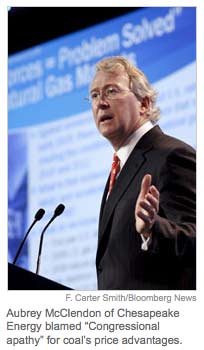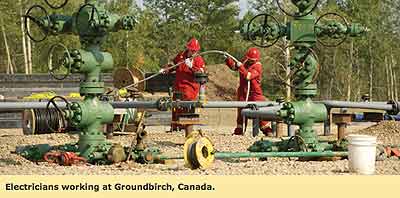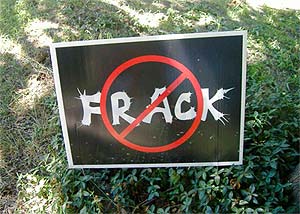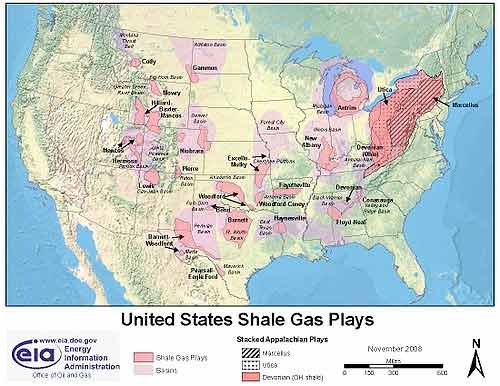Biblio
Environmentalists have long contended that the natural gas drilling method known as hydraulic fracturing — or “fracking” — poses a danger to drinking water supplies for millions of Americans.
Alarming reports of water contamination in states where such drilling is common, including Colorado, Pennsylvania and Wyoming, have exacerbated their fears.
Environmentalists believe disclosure rules will help them prove that their long-held claims about the inherent dangers of fracking are true. If testing finds an unusual chemical in a private water well, for example, it is far easier to make a connection to a nearby drilling operation that uses the same chemical.
Gas firms, despite their concerns over revealing proprietary chemical formulas to government regulators, acknowledge that there is a “fear of the unknown” when it comes to fracking, and they have come under increasing pressure to be more forthcoming about their operations. Many, but not all, now view disclosure as a way to build public trust, and to prove what numerous state and federal studies have already found: that fracking isn’t responsible for water contamination.
Comment
Arkansas Rule B-19
By Robert Finne on Dec 17, 2010 11:03:56 AM
The new Arkansas rule, like the Wyoming rule, is a gift to drillers from state regulators. It allows drillers to publicly say they are disclosing while they have a gaping loophole that allows them to arbitrarily decide what to disclose.
What this means is a driller can pick chemicals in his mix and declare them "trade secret" at which point he can say its a "Biocide" without actually revealing which biocide it is. There are hundreds if not thousands of chemicals in the biocide family.
Some are harmless and some are known carcinogens. The reason these companies say they need to maintain "trade secrets" is so that other companies don't get their formulas but their logic is flawed.
Who extracts the gas depends on who has the lease for the minerals. It's not as if someone is going too get their gas if they have their formula. Thats pretty simple.
The act of declaring "trade secret" only prevents someone from physically stealing a formula through industrial espionage. If a company reverse engineers or discovers by trial and error they are free to use it. Only a patent would prevent a competitor from duplicating a formula.
The ONLY reason to hide behind "trade secret" is to prevent the information of what they are using from becoming public knowledge.
"New York state environmental officials announced Friday that they would impose far stricter regulations for a new type of natural gas drilling in the state’s only two unfiltered water supplies, making it highly unlikely that any drilling will be done in the Catskills watershed that supplies drinking water to New York City...
...Although they did not impose an outright ban, state officials said that any natural gas company would have to conduct a separate environmental impact review for every well it proposed to drill in either watershed. In other areas, companies would face a far less cumbersome permit process that would rely on the state’s own environmental assessment of where drilling can be allowed...
...With a major controversy surrounding the proposed drilling out of the way, state officials said that they expected to release their final regulations on hydraulic fracturing by the end of the year after considering more than 14,000 public comments.
While it stirred deep opposition in New York City and nearby counties, the drilling drew substantial support from many upstate residents who argued that the benefits would far outweigh any risks given the weakness of the economy.
The conservation department’s commissioner, Pete Grannis, said that landowners’ property rights had weighed heavily in the decision not to issue a ban on drilling in the two watersheds. He said that about 70 percent of watershed property is privately owned and that a ban would have undoubtedly brought on lawsuits from owners deprived of lucrative leasing deals with gas companies.
“At the end of the day, an outright ban risks very substantial litigation,” he said.
Instead, the department decided to add more scrutiny to any potential application to drill in the two areas, he said.
But while the well-by-well environmental reviews will be a deterrent to the drilling, environmental groups were not claiming victory. Kate Sinding, a senior attorney with the Natural Resources Defense Council, said nothing but a ban would ensure that gas companies do not exploit the watersheds in the future.
“If they get into the shale and find it productive, they’re going to knock on the door of the watershed,” she said. “This announcement puts off for another day a decision that could be made today"...
...Jim Smith, a spokesman for the Independent Oil and Gas Association of New York, called the state’s regulatory stance “excessive and unnecessary.”
...Deborah Goldberg, an attorney with Earthjustice, an environmental law firm, said the final SGEIS must include substantial changes to account for the cumulative effect of drilling thousands and perhaps tens of thousands of Marcellus wells in New York. If not, the firm will help spearhead a legal challenge, most likely in state Supreme Court in Albany.
That would involve filing an Article 78 Proceeding challenging the DEC's adherence to the State Environmental Quality Review Act.
See: Eileen Millett, Toxic Tort Litigation Blog.
The challenge for attorneys and for courts will arise as communities grapple with:
- Managing the use of water, water withdrawals, what authority controls and who regulates;
- Impacts if any on waterbodies and aquatic life in affected water bodies accepting chemical fluids of varying composition;
- Adequacy and availability of treatment and pre treatment facilities.
See: Dave Cohen. Energy Bulletin. "Shale Gas Shenanigans" Mar 29 2010.
Lively blog by Karen Korell that included over 340 items and 119 items that mention the word "landowners". For example, Google this phrase to see an index of all articles on Splashdown! that mention the word landownders:
<landowners site:http://splashdownpa.blogspot.com/ >.
Pennsylvania based website includes videos and activist anti-facking links.
Splashdown's author, Karen Korell, died August 30, 2010.
Updated frequently. (I will miss you. Neil Zusman 2010-09-11.) Pennsylvania based website includes videos and activist anti-facking links. Updated frequently. Passionate, opinionated and truthful.
See Splashdown posting by Chris Hedges, "Clean Energy and Poisoned Water", May 25, 2009.
Chris Hedges is a senior fellow at The Nation Institute in New York City. He spent nearly two decades as a foreign correspondent in Central America, the Middle East, Africa and the Balkans. He has reported from more than 50 countries and has worked for The Christian Science Monitor, National Public Radio, The Dallas Morning News and The New York Times, for which he was a foreign correspondent for 15 years. He is a columnist for Truthdig.
Pennsylvania based blog covering many of the economic and ethical impacts of gas drilling for the people who are living with it.
We are among a group of property owners who have had the dual experience of receiving royalties from gas wells, then having our property rights seized for an underground natural gas storage field in the depleted gas wells.
This became a transformative two-year fight for our rights against eminent domain actions launched by Texas-based Spectra Energy Corporation, a natural gas storage company, and backed by the Federal Energy Regulatory Commission (FERC).
It is not a level playing field legally, economically or ethically for private property owners. Our fight led to the development of this website which focuses specifically on property rights that come under pressure from energy and utility companies.
See: Landman Report Card
There’s more carbon locked up in the high north’s permafrost than the combined total released into the atmosphere by humans. The big melt going on right now in the Arctic could trigger a train of catastrophic events across the world.
The Arctic’s soil and permafrost hold nearly twice as much carbon as the earth’s atmosphere, dwarfing the amount of carbon emitted to date by burning fossil fuels. Since the industrial revolution our dependence on coal and oil has ratcheted up the atmosphere’s carbon content, from 560 to 760 gigatons. Permafrost holds an estimated 1,400 gigatons of carbon.
In addition to carbon dioxide, the frozen source is releasing methane, a greenhouse gas 25 times more potent, though it stays in the atmosphere for only a decade rather than for millennia. The gas is bubbling up from land and also from a large, previously overlooked source: permafrost submerged beneath the Arctic Ocean. It’s too early to say whether this is a newly observed steady leak, or if it signals the beginning of a flood of methane.
See: Arctic Thaw May Release Greenhouse Gases from Siberian Peat Bogs
Virginia Smitske's son from Hickory PA narrates. Their water is tainted and government regulations have proven ineffective. They buy a lot of bottled water.
Here is a picture of the brown water. It's not always this brown, but its always full of toxins!
It's strange how people are so scared of the swine flu, but when you talk about how the gas drillers are poisoning our water, people think you're crazy, or they get mad because they think they can get rich off the deal the gas company is promising.
The money is more important to them than their health.
Good job Mr. Kunstler!
If you're offended by salty language, he may not be for you, but the tricks of Big Gas should offend you a whole helluva lot more.
The real story of what happened to the family in Texas that Ms. Stahl did not go into nearly enough. Fracking also reduced their land value from $257,330 on the 2010 tax rolls to its current value of $75,340.
--Vincent Alabama Confidential, outspoken Alabama political bloggers.
So, last night [2010-11-14] CBS hauled Aubrey McClendon, CEO of Chesapeake Energy, on board their flagship Sunday infotainment vehicle, 60 Minutes, to blow a mighty wind up America's ass (as they say in professional PR circles). America is lately addicted to lying to itself, and 60 Minutes has become the "go-to" patsy for funneling disinformation into an already hopelessly confused, wishful, delusional, US public.
McClendon told the credulous Leslie Stahl and the huge viewing audience that America "has two Saudi Arabia's of gas." Now, you know immediately that at least half the viewers misconstrued this statement to mean that we have two Saudi Arabia's of gasoline.
Translation: don't worry none about driving anywhere you like, or having to get some tiny little pansy-ass hybrid whatchamacallit car to do it in, and especially don't pay no attention to them "green" sumbitches on the sidelines trying to sell you some kind of peak oil story.... It also prepared the public to support whatever Mr. McClendon's company wants to do, because he says his company will free America from its slavery to OPEC. By the way, CBS never clarified these parts of the story by the end of the show.
Fossil fuels have powered human growth and ingenuity for centuries. Now that we're reaching the end of cheap and abundant oil and coal supplies, we're in for an exciting ride. While there's a real risk that we'll fall off a cliff, there's still time to control our transition to a post-carbon future.
See:Heinberg, Richard, and Daniel Lerch. The Post Carbon Reader: Managing the 21st Century's Sustainability Crises. 1st ed. University of California Press, 2010.
Music clip used in video below: Reed, Lou. Walk On The Wild Side (1972). RCA/BMG Heritage, 2002.
Post Carbon Institute provides individuals, communities, businesses, and governments with the resources needed to understand and respond to the interrelated economic, energy, and environmental crises that define the 21st century. We envision a world of resilient communities and re-localized economies that thrive within ecological bounds.
Climate change, the end of cheap fossil fuels, and our growth-dependent global economy are creating challenges of a scale and complexity never before seen. These unprecedented challenges call for wholly new approaches.
Post Carbon Institute has gathered 29 of the world's leading experts to point the way forward through a systems oriented, interdisciplinary, and collaborative approach. Through strong partnerships with the Transition Initiative movement and other leading innovators, we work to transform lives and communities through a powerful combination of integrated thinking and replicable direct action. These symbiotic relationships among on-the-ground leaders and grassroots organizers provide the opportunity to immediately implement and test generated ideas and strategies.
The Institute has developed a number of programs and initiatives that further its mission. Visit our program page to learn more.
See: Paul Tolme. 2010-05-14. National Wildlife Federation. "The Dirty Truth Behind Clean Natural Gas".
Flavin, C., and S. Kitasei. The Role of Natural Gas in a Low-Carbon Energy Economy. Briefing paper. Natural Gas and Sustainable Energy Initiative. Washington, D.C.: Worldwatch Institute, 2010. (PDF, 617kb)
Read this assessment by Robert W. Howarth, of Cornell University, who writes, "natural gas is far less attractive than other fossil fuels in terms of the consequences for global warming."
See: Natural Gas Drillers Protest Nomination of Fracking Critics for EPA Review Panel
Sierra Club Finger Lakes Group Gas Information Page.
Website includes Editorial by Gene Stolfi, Winter 2009. "Marcellus Shale —To Drill or Not To Drill?" Finger Lakes Group ExCom, Steuben Environmental Management Council
This web page includes links to scientific background information, Documents of Interest: "MSDS Data Sheets from NYS DEC for 48 Fracking Chemicals used in NY".
On May 28, 2010, Bloomberg.com reported that Royal Dutch Shell Plc agreed to buy closely held East Resources Inc., for about $5 billion.
East Resources will no longer be a U.S. corporation.
Author Ken Saro-Wiwa was a member of the Ogoni people, an ethnic Nigerian minority whose hometown, Ogoniland, in the Niger Delta has been targeted for crude oil extraction since the 1950s and which has suffered extreme and unremediated environmental damage from decades of indiscriminate oil waste dumping. Saro-Wiwa, initially as spokesperson, and then as President, of the Movement for the Survival of the Ogoni People (MOSOP), led a nonviolent campaign against environmental degradation of the land and natural waters of Ogoniland by the operations of multinational oil companies, especially Shell.
At the peak of his non-violent campaign, Saro-Wiwa and the other members of the Movement for the Survival of the Ogoni People were arrested, hastily tried by a special military tribunal, and hanged in 1995 by the Nigerian military government of General Sani Abacha, all on charges widely viewed as entirely politically motivated and completely unfounded. Their executions provoked international outrage and resulted in Nigeria's suspension from the Commonwealth of Nations.
Shell has been brought on trial in New York with the accusation of having collaborated with the military executions, and in June 2009, it has settled out of court for US $15 million to bring the case to an end.
See: Ed Pilkington. "Shell pays out $15.5m over Saro-Wiwa killing." The Guardian. June 9, 2009.
See: Jad Mouawad. "Shell to Pay $15.5 Million to Settle Nigerian Case." NYT. June 8, 2009.
Shell Gas Flaring is Illegal Says Benin City High Court
See: Poison Fire
Why the delay in remediation?
See: Shell Oil statement. Flaring in Nigeria.
The gas gathering programme has been delayed by funding shortfalls from the major government shareholder and security concerns which meant it was not safe for staff to work in large parts of the delta for long periods of time.
However, Shell Petroleum Development Company of Nigeria Limited (SPDC) and its partners continue to invest in reducing flares and have resumed work on many delayed projects and started new ones. SPDC is currently improving or installing associated gas gathering (AGG) facilities at 19 flowstations.
In late 2009, projects were sanctioned to install AGG facilities at a further seven flowstations. In total these projects represent an investment of over $2 billion. When all this work is completed it will cover more than 75% of SPDC’s production potential.
Shell and Hydraulic Fracturing
At Shell we have decades of experience with this technology and we continue to follow strict measures to protect drinking water supplies.
Shaleshock Action Alliance is a movement that works toward protecting our communities and environment from exploitative gas drilling in the Marcellus Shale region.
Shaleshock is an alliance of Working Groups which include people who have signed leases, not signed leases, who have been compulsorily integrated, and people who don't own land.
See: A collection of websites and listservs edited by Shaleshock.
See: Updated Calendar of Events For New York and Pennsylvania.
See: Driling 101 - background information on hydraulic fracturing.
"With the rapid development of the shale plays across the U.S., there was a massive influx of lease purchases which drove companies with cash into a bidding frenzy," said Ryan. (Neal Ryan, managing partner at Ryan Oil & Gas Partners LLC.)
"Now many of those companies are being forced to continue drilling plans formulated for a much higher market price in order to protect those lease investments," he said.
That's "a dangerous spot to be in because the domestic market doesn't need this gas right now, but companies are stuck having to protect their capital investment," he said.
EnergyBulletin.net is a clearinghouse for information regarding the peak in global energy supply. It is published by Post Carbon Institute whose goal is to provide a roadmap for a transition to a resilient, equitable, and sustainable world by arming individuals, communities, businesses, and governments with the information and resources they need to understand and take action.
Shale Gas Shenanigans
...These shale gas producers are an asset play. And this outcome obviously benefits the Wall Street banks who lend them money. Indeed, this is their exit strategy from the unprofitable drilling treadmill they are currently on. If shale gas production can be said to be in a bubble, this is where that bubble lies. And the strategy is working! Rigzone reports on the acquisition frenzy...
Energy Bulletin is maintained by three editors, Simone Osborn, Kristin Sponsler, and Bart Anderson, based respectively in Bristol, UK, and California USA. Adam Grubb (writing as Adam Fenderson) and Liam Cranley of Melbourne, Australia, founded Energy Bulletin in 2004.
On January 14, 2009, Energy Bulletin was adopted as a core program by the Post Carbon Institute. Except for PCI, Energy Bulletin is unaffiliated with any private, government, or institutional body.
Shale gas in the United States is rapidly increasing as a source of natural gas. Led by new applications of hydraulic fracturing technology and horizontal drilling, development of new sources of shale gas has offset declines in production from conventional gas reservoirs, and has led to major increases in reserves of US natural gas.
Please note that information taken from Wikipedia should be verified using other, more reliable sources. It is a good place to start research, but because anyone can edit Wikipedia, we do not recommend using it in research papers or to obtain highly reliable information.
Shale gas has plenty of detractors.
Environmentalists say fracking, a process in which drillers blast water into a well to shatter rock and unleash the gas, threatens pristine watersheds. Dish, a hamlet of 180 residents north of Fort Worth, Texas, has almost as many wells, compressors and pipelines as people.
‘Children, Old People’
Last year, the Texas Commission on Environmental Quality found benzene, which it classifies as a carcinogen, at 10,700 times the safe long-term exposure limit next to a well 6 miles (10 kilometers) west of town on which a valve had been left open.
“We have children, old people, pregnant women,” Mayor Calvin Tillman says. “They’re not supposed to be subjected to toxins.”
Switzer, who moved to Dimock Township, Pennsylvania, to build a $350,000 dream home with her husband, Jimmy, in 2004, had no idea how shale gas would consume her village of 1,400.
She says she found so much methane in her well that her water bubbled like Alka-Seltzer. Neighbor Norma Fiorentino says methane in her well blew an 8-inch-thick (20-centimeter-thick) concrete slab off the top. The $180 bonus Cabot paid to drill on Switzer’s 7.2 acres (2.9 hectares) and the $900 in royalties she gets each month don’t compensate, she says.
‘Beads and Baubles’
“I feel like one of the Indians who sold Manhattan for beads and baubles,” she says.
The economics of shale don’t look great right now for big companies either. Natural gas prices plunged to $2.41 per MMBtu in September 2009 from $13.69 in July 2008 as the recession cut demand while drilling accelerated. On May 24, gas traded at $4.04.
Includes related videos: John Hanger, secretary of Pennsylvania’s Department of Environmental Protection, talked with Bloomberg's John Lippert in Harrisburg, Pennsylvania, on May 13 about regulation of shale-gas drilling operations in the commonwealth.
By JOHN M. BRODER, New York Times, January 21, 2010. "In a direct challenge to the Environmental Protection Agency’s authority, Senator Lisa Murkowski, Republican of Alaska, introduced a resolution on Thursday to prevent the agency from taking any action to regulate carbon dioxide and other climate-altering gases."
Senator Lisa Murkowski is challenging the authority of the Environmental Protection Agency.







